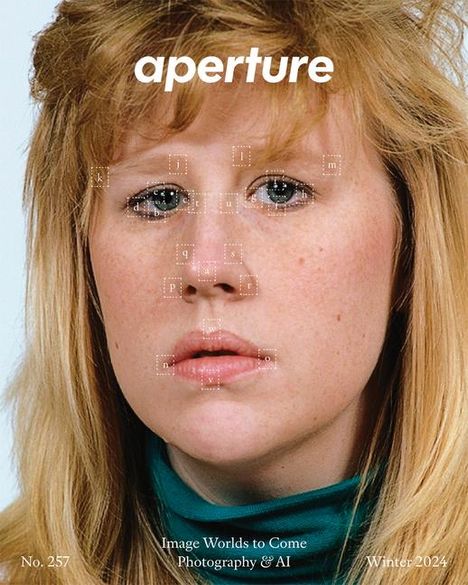Aperture: Image Worlds to Come: Photography & AI, Kartoniert / Broschiert
Image Worlds to Come: Photography & AI
- Aperture No. 257
(soweit verfügbar beim Lieferanten)
- Verlag:
- Aperture, 12/2024
- Einband:
- Kartoniert / Broschiert
- Sprache:
- Englisch
- ISBN-13:
- 9781597115698
- Artikelnummer:
- 11945809
- Gewicht:
- 567 g
- Maße:
- 264 x 212 mm
- Stärke:
- 14 mm
- Erscheinungstermin:
- 1.12.2024
- Hinweis
-
Achtung: Artikel ist nicht in deutscher Sprache!
Klappentext
This winter, Aperture presents "Image Worlds to Come: Photography & AI," a timely and urgent issue that explores how artificial intelligence is quickly transforming the field of photography and our broader culture of images. Moving beyond hype and hysteria, the essays, interviews, and artist portfolios in this issue provide a crucial resource for understanding the ways in which this fast-evolving technology is reshaping photography's relationship to creativity, authorship, and truth.
To weigh the risks and possibilities of this transformative change, Aperture has turned to some of the leading thinkers in the field. Artist Trevor Paglen and researcher Kate Crawford demystify the "intelligence" of AI and outline its threats to privacy, democracy, and the planet. Pioneering media theorist Fred Ritchin and journalist Brian Palmer unravel the implications of artificial intelligence on the photographer's role as a credible witness. Cultural critic Nora N. Khan explains why we need new criteria to interpret generative images. Rob Horning argues for a more complex understanding of photography's relationship to reality, exposing how the idea of a "real photo" has always been incoherent, while Peter J. Karol delves into the bizarre realm of AI copyright law, examining the unlikely precedents used to develop legal frameworks in the United States.
"The field of photography continually shifts due to emergent technologies, and AI is a big one," says Michael Famighetti, Aperture's editor in chief. "It felt important for us to assemble some of the leading voices grappling with the questions, ideas, opportunities, risks, and problems posed by AI. These issues are significant, and they are here to stay. We hope this issue will be a useful reference and resource for our readers."
"Image Worlds to Come" looks at the past as much as the future. Art historian Noam M. Elcott and technologist Tim Trombley train their own AI model on the Farm Security Administration's vast and storied archive, mimicking photographers like Dorothea Lange and Gordon Parks with revelatory precision. Artist Minne Atairu examines the racial biases of AI systems in beguiling portraits and imagined continuations of the contested Benin Bronzes, exposing how legacies of colonialism are perpetuated in the datasets of mainstream platforms like Midjourney. And photographer Charlie Engman contributes a portfolio of indelible "cursed images" inspired by a feeling of being "nostalgic for the present."
The cover of Aperture issue 257 features a work by Trevor Paglen from his 2017 seriesIt Began as a Military Experiment. The project, focusing on machine learning, consists of images taken of US military employees in the mid-1990s that the Department of Defense used to train early facial recognition software, technology that is now embedded in everyday life.
"Photography is the paradigm of human-technology interfaces," Paglen tells art historian Sarah M. Miller in an extensive interview. "People who think critically about photographs have a great deal to contribute, in terms of trying to conceive of and implement the kind of world that we want to live in, because the world is increasingly hard to distinguish from photography."
"Image Worlds to Come" begins to map a transformative moment for the medium, as we enter an era that will require us to look harder and deeper at photographs than ever before.

